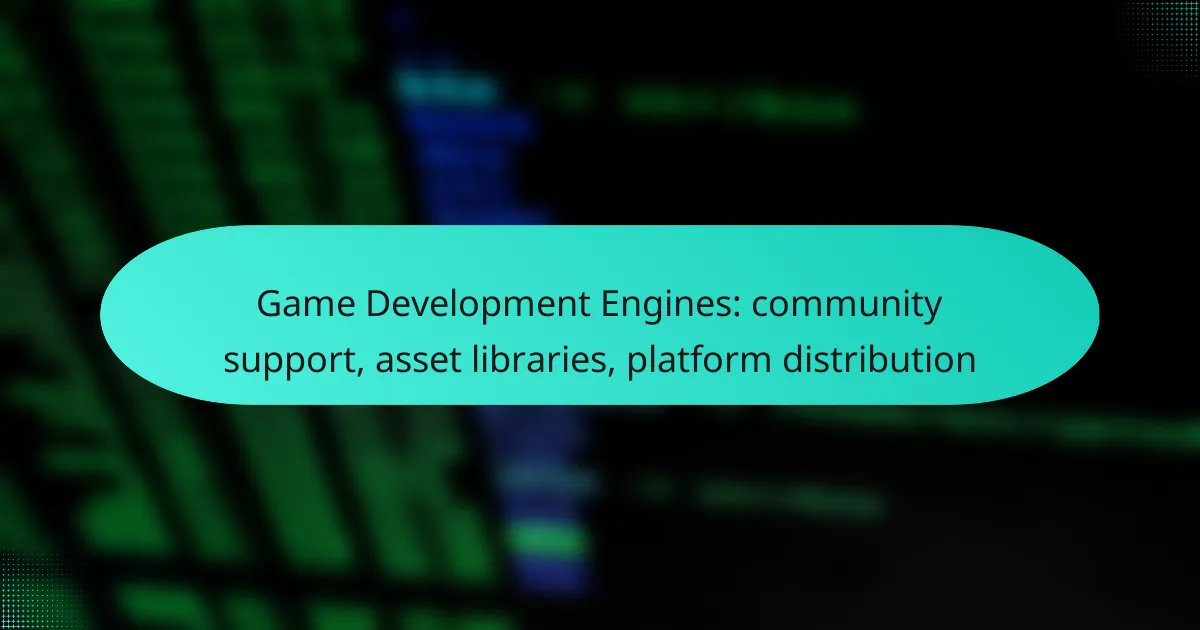In Canada, game development engines like Unity, Unreal Engine, Godot, GameMaker Studio, and CryEngine are popular for their strong community support, extensive asset libraries, and efficient platform distribution. A vibrant community enhances usability by offering resources and collaboration opportunities, while comprehensive asset libraries provide pre-made graphics, sounds, and scripts that streamline the development process and improve the overall quality of games.

What game development engines are popular in Canada?
In Canada, several game development engines stand out due to their robust community support, extensive asset libraries, and effective platform distribution capabilities. Unity, Unreal Engine, Godot, GameMaker Studio, and CryEngine are among the most favored choices for developers across the country.
Unity
Unity is widely recognized for its versatility and user-friendly interface, making it a top choice for both indie developers and large studios in Canada. It supports 2D and 3D game development and offers a vast asset store, allowing developers to find and integrate resources easily.
With strong community support, Unity provides numerous tutorials and forums for troubleshooting and learning. It also facilitates cross-platform distribution, enabling developers to publish games on various platforms, including PC, consoles, and mobile devices.
Unreal Engine
Unreal Engine is known for its high-quality graphics and powerful performance, making it ideal for AAA game development. Canadian developers appreciate its robust tools for creating visually stunning environments and characters.
The engine offers a comprehensive marketplace for assets and plugins, along with extensive documentation and community forums. Unreal Engine’s Blueprint visual scripting system allows developers to create complex gameplay mechanics without extensive coding knowledge.
Godot
Godot is an open-source game engine gaining popularity in Canada due to its lightweight design and flexibility. It supports both 2D and 3D game development and features a unique scene system that simplifies game organization.
With a growing community, Godot offers various tutorials and resources for developers. Its ability to export games to multiple platforms without additional fees makes it an attractive option for indie developers looking to maximize their reach.
GameMaker Studio
GameMaker Studio is particularly favored for 2D game development, making it a go-to choice for many Canadian indie developers. Its drag-and-drop interface allows for quick prototyping and development, which is ideal for smaller teams or solo developers.
The engine includes a built-in asset library and supports various platforms, including mobile and desktop. However, developers should be aware of its limitations in 3D capabilities compared to other engines.
CryEngine
CryEngine is known for its stunning graphics and realistic physics, making it suitable for high-end game development in Canada. It is often used for first-person shooters and open-world games due to its powerful rendering capabilities.
While it has a steeper learning curve, CryEngine offers comprehensive documentation and a dedicated community. Developers should consider the engine’s licensing model, which may involve costs depending on the project’s scale and revenue.

How does community support impact game development engines?
Community support significantly enhances the usability and effectiveness of game development engines. A strong community provides resources, facilitates collaboration, and fosters innovation, making it easier for developers to troubleshoot issues and share knowledge.
Active forums and user groups
Active forums and user groups are vital for game developers as they serve as platforms for discussion and problem-solving. Developers can ask questions, share experiences, and receive feedback from peers who may have faced similar challenges. Engaging in these communities can lead to quicker resolutions and a deeper understanding of the engine’s capabilities.
Popular game development engines often have dedicated forums where users can post queries and receive advice. For instance, engines like Unity and Unreal Engine have extensive community forums that feature threads on various topics, from beginner tips to advanced programming techniques.
Access to tutorials and resources
Access to tutorials and resources is crucial for both novice and experienced developers. Comprehensive tutorials help users learn the engine’s features and best practices, while additional resources like asset libraries and sample projects can accelerate the development process. Many engines offer official documentation, which is often supplemented by community-created content.
For example, platforms like YouTube and dedicated websites host countless video tutorials and written guides that cover everything from basic setup to complex game mechanics. This wealth of information allows developers to find solutions tailored to their specific needs.
Feedback and feature requests
Community feedback plays a significant role in shaping the development of game engines. Users can submit feature requests and report bugs, allowing the engine’s developers to prioritize updates based on actual user needs. This feedback loop ensures that the engine evolves in a way that meets the demands of its user base.
Many engines have formal channels for submitting feedback, such as GitHub repositories or dedicated feedback forms. Engaging with these channels can lead to improvements that benefit the entire community, making it essential for developers to voice their opinions and suggestions actively.

What asset libraries are available for game development engines?
Game development engines offer various asset libraries that provide developers with pre-made resources like graphics, sounds, and scripts. These libraries can significantly speed up the development process and enhance the quality of the final product.
Unity Asset Store
The Unity Asset Store is a comprehensive marketplace where developers can purchase or download free assets specifically designed for Unity projects. It features a wide range of resources, including 3D models, animations, sound effects, and complete project templates.
When using the Unity Asset Store, consider the licensing agreements, as some assets may have restrictions on commercial use. Regularly check for sales or bundles to maximize your budget.
Unreal Marketplace
The Unreal Marketplace serves a similar purpose for developers using Unreal Engine, offering a vast selection of high-quality assets. Here, you can find everything from character models to entire environments, often created by professional artists.
Keep an eye on the marketplace for free monthly offerings, which can help you build your asset library without spending much. Be mindful of the asset compatibility with your specific version of Unreal Engine to avoid integration issues.
OpenGameArt
OpenGameArt is a community-driven platform that provides free game assets under various open licenses. It includes 2D and 3D art, sound effects, and music, making it a valuable resource for indie developers and hobbyists.
While many assets are free, always check the licensing terms to ensure compliance, especially if you plan to monetize your game. The quality can vary, so it’s wise to review user ratings and comments before downloading.
itch.io assets
itch.io is primarily known as a platform for indie games, but it also features an asset store where developers can buy and sell game assets. The selection includes sprites, soundtracks, and even game templates, often created by independent developers.
Explore bundles and pay-what-you-want options to find unique assets at a low cost. Since assets are often sold directly by creators, you can communicate with them for support or customization requests.

How do game development engines support platform distribution?
Game development engines facilitate platform distribution by providing tools and features that streamline the process of releasing games across various platforms. These engines often include built-in support for multiple operating systems and consoles, making it easier for developers to reach a wider audience.
Cross-platform capabilities
Many game development engines, such as Unity and Unreal Engine, offer cross-platform capabilities that allow developers to create games that run on different systems like Windows, macOS, Linux, and mobile devices. This flexibility enables developers to target a broader market without needing to rewrite code for each platform.
When choosing an engine, consider its compatibility with the platforms you intend to support. Look for engines that provide robust documentation and community support for cross-platform development, as this can significantly reduce development time and costs.
Publishing tools for consoles
Game engines typically include publishing tools specifically designed for console distribution, such as PlayStation, Xbox, and Nintendo Switch. These tools simplify the submission process, helping developers adhere to each console’s unique requirements and guidelines.
Ensure that the engine you select has established partnerships with console manufacturers, as this can facilitate smoother certification processes and access to exclusive features. Familiarize yourself with the specific requirements for each console to avoid common pitfalls during submission.
Integration with Steam and Epic Games Store
Integration with digital distribution platforms like Steam and the Epic Games Store is a crucial feature of many game development engines. These integrations often provide developers with tools to manage game updates, user reviews, and sales analytics directly from the engine.
When integrating with these platforms, consider the revenue sharing models and promotional opportunities they offer. For instance, Steam typically takes a percentage of sales, while Epic Games Store is known for its favorable revenue split. Understanding these aspects can help you make informed decisions about your game’s distribution strategy.

What criteria should be considered when choosing a game development engine?
When selecting a game development engine, consider factors such as target audience, platform compatibility, budget constraints, and licensing terms. These criteria will help ensure that the chosen engine aligns with your project goals and resources.
Target audience and platform
Understanding your target audience and the platforms they use is crucial when choosing a game development engine. Different engines excel in various areas, such as mobile, PC, or console development, and some may offer better tools for specific genres or styles of games.
For example, if your audience primarily plays mobile games, consider engines like Unity or Unreal Engine, which provide robust support for mobile platforms. Conversely, if you are targeting PC gamers, you might explore engines that offer advanced graphics capabilities and performance optimization.
Budget and licensing
Your budget and the licensing structure of the game development engine can significantly impact your project. Some engines are free to use but may charge fees based on revenue generated, while others require upfront payment or subscription fees. Assess your financial resources and potential revenue to determine the best fit.
Engines like Godot are open-source and free, making them ideal for indie developers with limited budgets. On the other hand, Unreal Engine requires a royalty payment after reaching a certain revenue threshold, which could be a consideration for larger projects. Always read the licensing agreements carefully to avoid unexpected costs.
